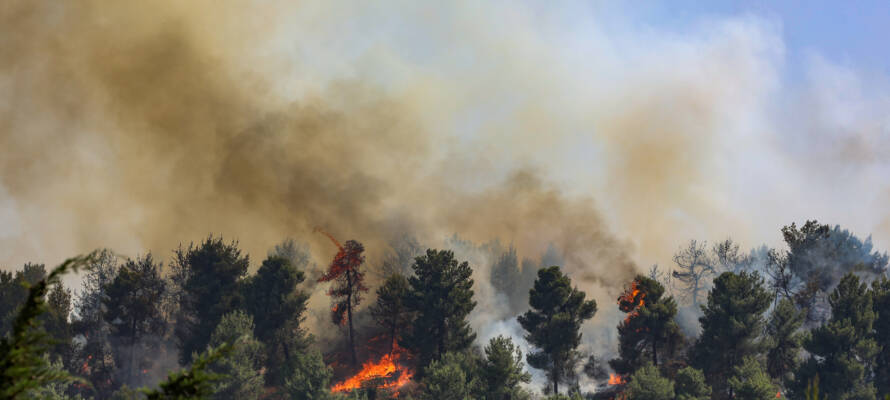Last Thursday, Hezbollah claimed to have launched some 150 rockets and 30 drones in its ‘largest and most comprehensive attack’ since the start of the war.
By JNS
The Israel Defense Forces’ Northern Command has approved operational plans for a war against the Hezbollah terrorist group in Southern Lebanon, the army announced on Tuesday.
The plans were “authorized and validated” by Northern Command head Maj. Gen. Uri Gordin and Maj. Gen. Oded Basiuk, who leads the military’s Operations Directorate, the IDF said.
As part of a situational assessment held at the Northern Command base in Safed, the two commanders also took several decisions “on the continuation of increasing the readiness of troops in the field.”
Iran-backed Hezbollah has attacked northern Israel nearly every day since joining the war in support of Hamas on Oct. 8, killing more than 20 people and causing widespread damage. Tens of thousands of Israeli civilians remain internally displaced due to the ongoing violence.
Since Oct. 8, Hezbollah has fired more than 5,000 rockets, anti-tank missiles and suicide drones at Israeli border communities.
The Iran-backed terrorist group ramped up its attacks last week. On Thursday, it claimed to have launched some 150 rockets and 30 drones in its “largest and most comprehensive attack” since the start of the war. Two people sustained light wounds, and the attacks caused widespread destruction.
Following a two-day lull in hostilities earlier this week, Hezbollah resumed its attacks on Tuesday afternoon, launching three “suspicious aerial targets” toward towns in the Upper Galilee, the IDF said.
Also on Tuesday, Hezbollah published video captured by a surveillance UAV of the Haifa Port, one of Israel’s most important commercial shipping gateways.
According to local media, the incident took place last week, and the IDF made the decision not to intercept the drone as it did not pose a threat, and due to the fear that interception fragments could hurt civilians.
Also on Tuesday, U.S. presidential envoy Amos Hochstein spoke in Beirut following talks with government officials, including Parliament Speaker Nabih Berri, a powerful ally of Hezbollah.
“The conflict along the Blue Line [the de facto border] between Israel and Hezbollah has gone on for long enough,” Hochstein said after the meeting with Berri. “Innocent people are dying, property is damaged, families are shattered and the Lebanese economy continues to decline. The country is suffering for no good reason. It’s in everyone’s interest to resolve it quickly and diplomatically,” he added.
During a meeting with Israeli Prime Minister Netanyahu in Jerusalem the previous day, Hochstein rejected Jerusalem’s earlier demand that any diplomatic deal to end the conflict in the north be based on the implementation of U.N. Security Resolution 1701—which was adopted to end the Second Lebanon War in 2006 and calls for a demilitarized zone from the Blue Line to the Litani River some 18 miles to the north.
Instead, he said it should include a range of options, including moving Hezbollah six miles from the border. He stressed that the United States was concerned about further escalation and called for calm on both sides.
The intensifying aggression is driving the Middle East towards a wider escalation that could have catastrophic consequences for Lebanon and the region, IDF Spokesman Brig. Gen. Daniel Hagari warned on Sunday.
According to Hagari, because of Lebanon’s refusal to comply with Resolution 1701, the IDF will take “the necessary measures to protect its civilians until security along our northern border with Lebanon is restored.”
The Oct. 7 massacre “cannot—will not—happen again on any one of Israel’s borders. Israel has a duty to defend the people of Israel. We will fulfill that duty at all costs,” concluded the military spokesman.
